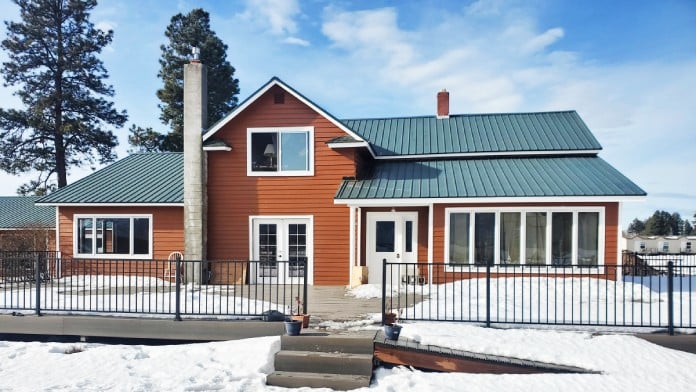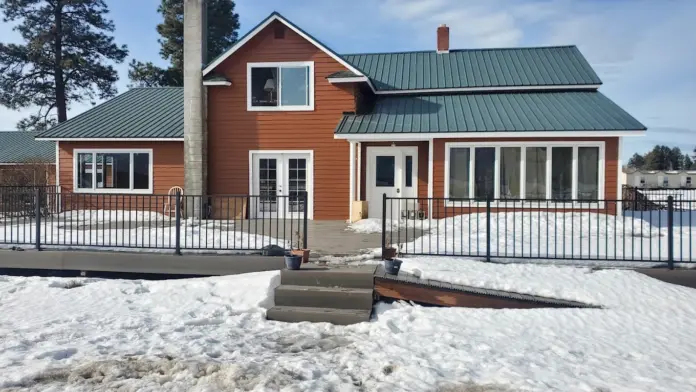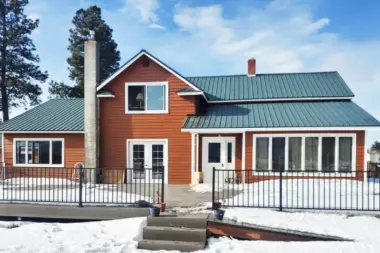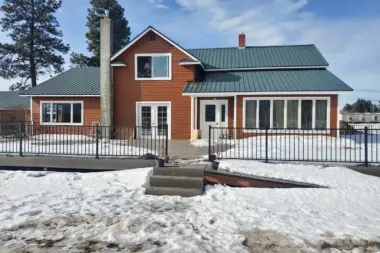This place was unbelievable. The staff is kind and caring. The food was amazing. Steak and shrimp every Saturday night. My LAC was great and Cheryl my case manager worked extremely hard for me to get into sober living. I am forever grateful for this place.
About Recovery Centers of Montana
Located just between La Salle and Columbia Falls, Montana, you’ll find the Recovery Centers of Montana’s (RCM) men’s ranch. This location is one of two RCM facilities where they offer gender specific, residential recovery programs for those looking to break free from addictions.
In a nutshell, RCM’s recovery program is a holistic endeavor in which their hardworking staff provide you with a structured path to freedom from addiction. Their program runs for just over 30 days, and in that time, you’ll receive the benefit of great food, activities, counseling and bonding. The service here is incredibly well reviewed, with most reviewers crediting RCM with having helpful and hardworking staff and wonderful amenities.
A Holistic Approach to Counseling and Development
Their counseling care model helps you overcome your personal struggles and develop internal character through individual counseling and spiritual development. They have licensed addiction counselors, case managers and rehab aides on staff to support you in every aspect of your healing journey; behavioral, practical and spiritual.
Their program also offers opportunities for group counseling and peer support meetings. A unique focus of theirs is that the men’s ranch tries to foster a sense of brotherhood, allowing members of the community to connect on a deeper level and help carry each other’s burdens.
Healing Through Adventure
One of the best parts of their service is that the location offers not only the beautiful tranquility of semi-rural Montana, but also excellent adventure activities. The ranch boasts opportunities for hiking, bonding around the campfire, camping and participation in their farm’s day to day operations. The fact that their program is open to individuals on Medicaid also makes this one of the most accessible programs of its kind.
Latest Reviews
Rehab Score
Gallery




Other Forms of Payment
Self-pay involves paying for treatment out of your own pocket. You can use savings or credit, get a personal loan, or receive help from family and friends to fund your treatment. If you don't have insurance or your insurance plan doesn't cover a specific program, self-pay can help ensure you still get the care you need.
Private insurance refers to any kind of healthcare coverage that isn't from the state or federal government. This includes individual and family plans offered by an employer or purchased from the Insurance Marketplace. Every plan will have different requirements and out of pocket costs so be sure to get the full details before you start treatment.
Medicaid is a state based program that helps lower-income individuals and families pay for healthcare. Medicaid covers addiction treatment so those enrolled can use their coverage to pay for rehab. When a program accepts Medicaid the client often pays very little or nothing out of their own pocket.
Addiction Treatments
Levels of Care
Outpatient Programs (OP) are for those seeking mental rehab or drug rehab, but who also stay at home every night. The main difference between outpatient treatment (OP) and intensive outpatient treatment (IOP) lies in the amount of hours the patient spends at the facility. Most of the time an outpatient program is designed for someone who has completed an inpatient stay and is looking to continue their growth in recovery. Outpatient is not meant to be the starting point, it is commonly referred to as aftercare.
Residential treatment programs are those that offer housing and meals in addition to substance abuse treatment. Rehab facilities that offer residential treatment allow patients to focus solely on recovery, in an environment totally separate from their lives. Some rehab centers specialize in short-term residential treatment (a few days to a week or two), while others solely provide treatment on a long-term basis (several weeks to months). Some offer both, and tailor treatment to the patient's individual requirements.
12 step programs may be found both in addiction treatment centers and in the community, where meetings are anonymous, free, and open to the public. These programs presume that sustained recovery depends on spiritual, psychological, and emotional growth and healing. Religious affiliation isn't required, but the 12 step recovery model is based on the belief in a higher power. Peer sponsors support participants as they use the steps to cultivate self-awareness, forgiveness, acceptance, and accountability.
Programs
Adult rehab programs include therapies tailored to each client's specific needs, goals, and recovery progress. They are tailored to the specific challenges adult clients may face, including family and work pressures and commitments. From inpatient and residential treatment to various levels of outpatient services, there are many options available. Some facilities also help adults work through co-occurring conditions, like anxiety, that can accompany addiction.
Young adulthood can be an exciting, yet difficult, time of transition. Individuals in their late teens to mid-20s face unique stressors related to school, jobs, families, and social circles, which can lead to a rise in substance use. Rehab centers with dedicated young adult programs will include activities and amenities that cater to this age group, with an emphasis on specialized counseling, peer socialization, and ongoing aftercare.
Clinical Services
Participants in group therapy sessions in Rhode Island can see sobriety behaviors modeled by their peers. This provides you with inspiration and practical examples you may not have considered of how to manage addiction within the community and maintain your sobriety after rehabilitation.
Individual therapy for drug addiction is a collaborative process between yourself and your therapist. During your sessions, you address personnel experiences and emotional struggles head on. This helps your therapist gain insight into your addiction triggers and develop coping skills and a road map for sustained recovery.
Life skills, also referred to as coping skills, cover three categories: cognitive skills, interpersonal skills, and emotional skills. By working on each of these areas during treatment, you'll develop the skills you need to navigate daily life in recovery
Recreational therapy is offered within a holistic treatment center for alcohol and drug addiction treatment. It provides you with structured activities that improve your physical and mental health, such as sports, creative arts, and nature activities. These help you express your emotions and reduce stress while building a supportive network and community of peers.
Contact Information
381 Wickenden St
Providence, RI 02903